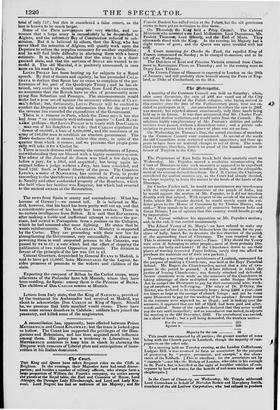The Proprietors of East India Stock held their quarterly court
on Wednesday. ?.Jr. Poynder moved a resolution recommending the Court of Directors to take such measures as appeared to be expedient for the suppression of idolatrous worship in India, and the.relinquish- ment of the revenue derived therefrom. Sir J. R. Carnac, the Chairman, considered the motion unneces4ary, as the Court had already decided, by a large majority, to leave the matter in the hands of the hands of the Directors.
Sir Charles Forbes said, he would not countenance any interference- with the religious rites or ceremonies of the people of India; but he would support the motion of Mr. Poynder, as it did not interfere directly with that subject. With respect to the morals of the natives of India, which Mr. Poynder decried, he would merely quote the evi- dence given to the House of Commons by Sir Thomas Munro ; who said—" Were morals to be an article of commerce between India and Great Britain, I am of opinion that this country would benefit greatly by importation."
Sir J. Carnac withdrew his opposition to Mr. Poynder's motion; and, in the end, it was carried unanimously.
The Liberal Vestry of St. Maryle'alne have refused to make any allowance out of the rates, as has hitherto been the custom, for the pur- chase of holly, laurel, &c. to decorate the five churches of the parish at the approaching feast of Christmas. The sum required was 4/. This is economy with a vengeance !— Times. Why should the Vestry vote even 4/. belonging to other people—naost of them probably Dis- senters—for holly and laurel ? If the Churchmen desire to see their places of worship decorated Pagan fashion, surely they can afford to purchase the materials out of their own pockets.] Yesterday, a meeting of the parishioners of Lambeth, summoned for the purpose of making a Church-rate, was held at the Boys' Parochial School. Mr. Rogers the Churchwarden, moved that a rate of two- pence in the pound be granted. A debate followed, in which the justice of levying Church-rates, was fiercely attacked and defended. Severe comments were made on the meanness of the Churchmen in taking advantage of their multiplied votes under Sturges Bourne's- Act to compel the Dissenters to pay for their sacramental wine, wash- ing of surplices, and hell-ringing. The salary of Dr. D'Oyley, the Rector, was declared to be infamously large; being 250W. a year—just ten times as large as the average of church livings : and yet he came upon Dissenters to pay for the washing of his surplice ! Several item,. in the estimate were objected to, as illegal ; and in looking over the - accounts, it appeared that one bill of 1250/. had been paid and after- wards audited. Some of the speakers declared that they never would pay the rate until compelled ; and an amendment was moved, to adjourn the meeting to the 23d December, 1837. The amendment was carried, on a show of hands ; but a poll being demanded, the numbers were— For the rate $15
Against it 230 Majority for the rate 85 .
This result was expected by all parties ; the greater number of votes being with the Church party in Lambeth, though the majority of rate- payers is on the other side.
At a meeting held on Tuesday evening, at the London Coffeehouse, Ludgate Hill, it was resolved to form an association for the purpose of promoting by " prayer, persuasion, and example," a due obser- vance of the Sabbath. I rhis is excellent: let the associators act by " example "—not like the Bishop of London, who rides in his carriage to St. 'Paul's, but is horrified at the sight of humbler vehicles of con- veyance by land and water, for the benefit of toil-worn mechanics and shopkeepers.]


























 Previous page
Previous page